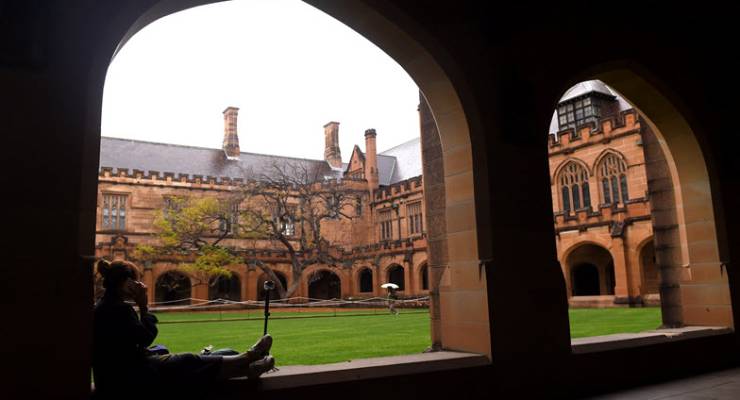
School closures have been causing acute anxiety and confusion for students and parents. Anthony Albanese’s characterisation of recent messaging on the issue as “clear as mud” resonated widely.
Students in Year 12, facing their final year of school and (in some states) highly stressful exams, are particularly worried.
Political leaders have differed widely on school closures. It is part of the price we pay for living in a federation, where states are responsible for education and take different approaches.
The NSW Education Standards Authority has announced the Higher School Certificate (HSC) is going ahead, although details of how assessment will be done are unclear. The Authority is delegating to principals “power to make decisions about the number and weighting of HSC formal assessment tasks for their school in 2020”. If this delegation is unfettered, presumably a generous principal could award all their students an automatic HSC; those without such principals will face continuing uncertainty.
In Victoria the Victorian Certificate of Education (VCE) relies heavily on final exams. The state’s education minister has said these could be postponed, meaning students may not finish their schooling this year.
Other states and territories are equally diverse in communications with students and parents. About the only certainty so far is that any national announcement from the prime minister will likely be overtaken by at least one of the state/territory schools systems on the ground.
Uncertainty about final assessment leads to further uncertainty about university admission. That is, for students with that aspiration.
Many people in industry and government would prefer less emphasis on universities and greater priority to other learning such as trades training — but that’s for another day. Students in Year 12 aiming for university are stressed about their ATAR anyway — just ask their parents! Now have reason to be even more so.
So in a time of COVID-19, is there an alternative?
One policy option for universities to consider is open admission for any student recommended by their school — that is, rely on teachers’ judgement about whether a student will be able to succeed.
Like ATAR, it would not be perfect: some teachers have poor judgement. But it could work, and even more importantly, it could be done quickly. Students could be admitted to university early — say, July this year — ending their uncertainty and anxiety.
Year 12 students would finish their schooling and start university in the second semester, taking online courses in the same way as any other remote student. Assuming there is no dramatic breakthrough in COVID-19, universities in any case will have to offer courses online, not in person. The economics of the internet are such that the marginal cost of adding an additional student to an online course is small.
The further advantage of admitting Australian students from mid year is that universities will be somewhat short of international students by then.
Many universities have extended their “census dates” — the last date on which a student can withdraw from a course without financial and academic penalties — in an attempt to retain international students. News flash: most won’t be back this year. Some may never return. For the last half of 2020, at least, why not teach Australian students instead?
There may be no spare capacity in some oversubscribed and highly selective courses like medicine or engineering. Early entry may not work as well for these; rather than one size fits all, universities should exercise discretion over courses to which this policy would apply.
Knock on effects for fee-paying schools are also worth considering. Would they lose half a year’s worth of fees? Possibly not. A model to consider would be continuing dual enrolments in school and university simultaneously (it already happens for some TAFE courses).
Would early Year 12 entrants be prepared? For some subjects, maybe not. However many students are already admitted to their first year of university without required prerequisites and do a bridging course to catch up. Bridging courses could continue. Other subjects have no prerequisites and Year 12 students are in the same position regardless.
What about students who want a gap year? A year of work in between school and university can be a hugely beneficial experience; for some it may be a financial necessity. But there is no reason why a university that made an offer in July could not, just as at present, give students an option of deferring it.
It would not be administratively difficult for universities. They already divide the academic year into halves, and many currently offer students the option of starting in semester two.
Moreover, universities on average are good at delivering courses online (some are outstanding, others not so good). Most have pre-existing infrastructure — for example, lecture recording and online reading materials — far superior to that available in the average school.
In the event schools remain closed for face-to-face teaching, which at present looks likely, many Australian universities would provide a far richer and more rewarding online learning experience.
Difficult times require innovative responses. Bypassing traditional end-of-year mechanisms would help both students and universities. Is Australia bold enough to try?
Stephen Bartos is the former deputy secretary of the Finance Department and a director of Pegasus Economics.








It’s difficult to teach online well. It isn’t just broadcasting lectures (and in person those are poor anyway according to studies of learning quality).
And there are lab and clinical disciplines which require hands on work, not to mention learning in the workplace (internships, cooperative education etc).
Materials development in distance and online learning is a lengthy process involving several different specialists and significantly different student admin and support.
It only looks like a solution to the current crisis when you don’t understand it.
I’m not sure what you would intend for the cumulative hard subjects in STEM. Tertiary courses usually require full knowledge but then often re teach core secondary material just to be sure.
The real problem is an arithmetical one. If a whole academic year for all students is lost, then you must run a doubled up year for 13 years or bump up the school start age by a year so no years are doubled up. Alternatively if say only years 9-12 were repeated there’d be a doubled up year for four years. And so on.
“Many universities have extended their “census dates””. That surprises me a little as I’m fairly sure the census date is mandated by federal govt.
In one sense this is an option, and universities are bleeding money, particularly the G08, but the old adage ” never stand between a university and its next dollar” could see a lot of perverse outcomes.
But some imaginative thinking is required. I’d be looking at just putting the whole school year back by 6 months, for all years. There is no compelling reason to start a school year in January, and holidays can be re-worked so the hottest months are still the main holiday. Or we could air condition all schools, with solar installations as well. Good for the economy and a good investment.
Crazy, I know.